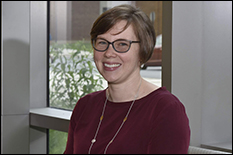News Story
Allison Reilly Wins NSF CAREER Award

When communities are hit by a disaster, their primary conduit for federal aid is the Federal Emergency Management Agency (FEMA)’s Public Assistance (PA) program, which provides funding that can be used to rebuild damaged infrastructure.
But the PA program is set up in a way that often incentivizes unwise decision-making by communities, says Allison Reilly, assistant professor of civil and environmental engineering at the University of Maryland. Reilly has just received an NSF CAREER Award that will support research intended to guide policy reform in this area.
“The federal government is mandated to provide funding for recovery regardless of any action or lack of action taken by local and state governments prior to a disaster,” Reilly said. “So there’s little incentive to prepare for it.”
As a result, federal resources are often sapped with no benefit to long-term resilience. Communities may often fail to discourage development in hazard-prone areas; after all, property taxes will flow in, and federal aid is mandated in case of catastrophe. “There are many examples of development being pushed in areas that are known to flood frequently or that are otherwise risky,” she said. “There’s no penalty for making risky decisions about where to build.”
“The federal government is mandated to provide funding for recovery regardless of any action or lack of action taken by local and state governments prior to a disaster. So there’s little incentive to prepare for it.”
Dr. Allison Reilly, assistant professor of civil and environmental engineering, University of Maryland
More evidentiary support is needed in order to guide policy reform, however, and that’s what Reilly’s research aims to provide.
With more than $500,000 in NSF support over the five-year grant, Reilly will use statistical models to examine how local capacity influences the level of PA that is awarded and how that impacts risk in the built environment. In addition, she will conduct a thorough evaluation of local decision-making processes in response to federal disaster policy using interviews and document analysis. The data she gathers will then be incorporated into simulation models that can be used to test projected policy reforms. To validate the models, Reilly will conduct a series of workshops involving policymakers, researchers, and engineering practitioners.
In addition to supporting research, educational initiatives are an important component of the NSF’s CAREER program. To help aspiring engineers become more familiar with the broader social impact of engineering decisions, Reilly will develop engineering civics modules and incorporate them into the classes she teaches. Ultimately, a full-fledged course, “Data Analysis for Civic Impact,” is planned.
The NSF award, considered one of the most prestigious available to early-career faculty, is intended to support emerging academic leaders as they chart their longer-term research trajectories. Reilly is among several Maryland Engineering faculty who have received this award, including fellow CEE assistant professor Shelby Bensi and mechanical engineering associate professor Katrina Groth.
Published February 2, 2022









